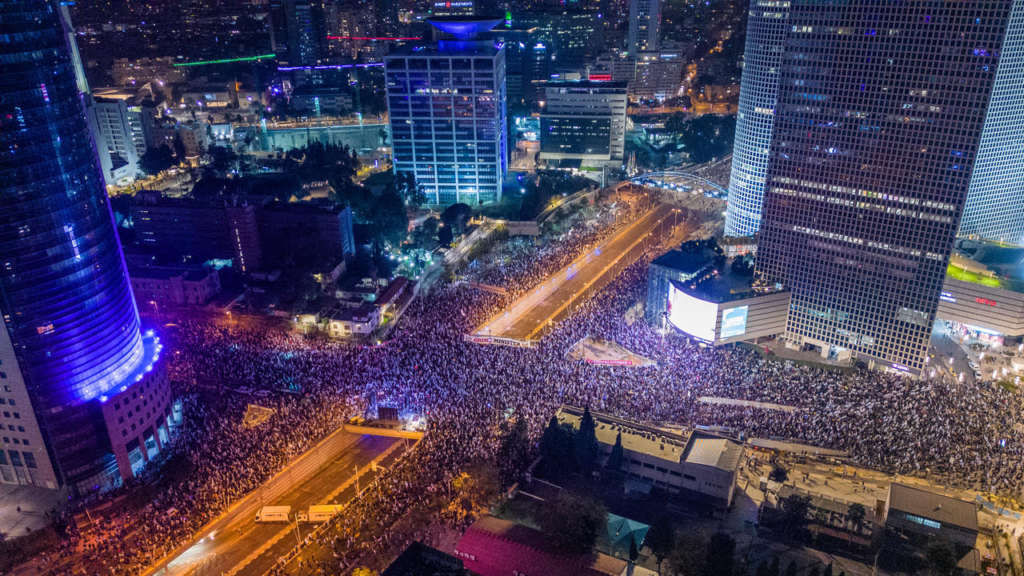Big business: the monetization of antisemitism
In a 2020 report, the Center for Countering Digital Hate, a British non-profit organization with offices in London and Washington, DC, found that “Facebook and Instagram [were] hosting dozens of accounts that sell neo-Nazi merchandise to fund far-right extremism.” Both social media behemoths are owned by Meta Platforms and the organization accused “tech giants” of providing purveyors of hate with “a platform to reach mainstream audiences and generate funding.”
Similarly, Cooper warned in December 2022 that “the monetizing of antisemitism” was one of the Simon Wiesenthal Center’s greatest concerns regarding the rise of anti-Jewish sentiment.
“We have to fight very hard to make sure [monetization] doesn’t become mainstream, so that someone’s going to get on a United Airlines flight wearing the swastika and say what’s wrong with that?” he said at the time.
“The sale of goods with antisemitic messaging and Nazi memorabilia is an issue of deep concern for Jewish communities,” European Jewish Congress Executive Vice-President & CEO Raya Kalenova tells The Media Line, calling it a “rising and lucrative phenomenon” with uneven responses that need to be regulated more tightly across countries and retail organizations.
“In some EU member states like Germany, Austria and France, it is illegal to sell Nazi ‘collectibles’,” she says. “In some other countries, there is a gray area to the advantage of large online retailers. Therefore, we must call for a systematic legal framework banning the sale of National Socialist symbols or other objects with clear antisemitic messages across Europe.
“Famous auction houses like Christie’s or Sotheby’s refuse to sell Nazi memorabilia; eBay also has an ‘offensive materials policy.’ It is important that giants like Amazon or smaller online retailers enforce clear guidelines regarding the sale of these forbidden items, using efficient AI searches and trained employees to remove them swiftly. At a time where hate speech and hate crimes are on the rise, it is up to the online marketplaces to ensure that their platform is not used to promote racism and antisemitism,” according to Kalenova.
Rich says that most of the mainstream payment services such as PayPal have done “a lot of work” to make sure that their services are not used by such sellers, but concedes that some will have “slipped through the net because it's just such a big ecosphere.”
Cooper also argues that the internet has enabled antisemites to monetize their hate. “Whenever there's a new tweak in internet technologies, you can be sure the antisemites will be there,” he says.
According to Rich, it is not just through merchandising that antisemitism and hate make money in the darker recesses of the internet, but also through ad revenue created by clicks on videos and other online media.
He gives the example of British extremist Tommy Robinson, founder of the xenophobic and Islamophobic English Defense League, whom he says has made a “pretty enormous income stream” from online videos.
“These people are content creators,” Rich says, “and they're following the same economic model as all content creators who make money that way, but that content is hate.”
Kalenova also accuses the media of benefiting from antisemitic expressions through “sensationalist” reporting that draws readers in. This increases traffic on their websites – and potentially ad revenue as well.
“Some news outlets serve as a daily clickbait platform for recognized antisemites to share their opinions and thoughts in an unrestricted way,” Kalenova tells The Media Line.
“The internet is a breeding ground for the spread of antisemitic rhetoric and certain media outlets take advantage of this dynamic to share all kinds of sensationalist articles,” she says. “Just recently, a lawsuit has been brought against French newspaper Le Monde for spreading a negative image of Sephardic Jews.”
Cooper argues that the only way to combat the current rise in antisemitism, including its monetization, is for Jews to stand firm and stand together and “find creative ways to hold internet companies accountable.”
“As long as there's no price to pay, this is just going to expand and expand and expand,” he said.
Thanks to Biden Administration, Iran's Mullahs Winners of Russia Invasion of Ukraine
Russia also reportedly wants to buy ballistic missiles from Iran, which has the largest and most diverse ballistic missile arsenal in the Middle East. The Iranian regime therefore should officially be considered an accomplice to Russia's war crimes.US indictment: Russian spy sought to gather intel on Israelis, including party head
The Iranian regime, probably because it knows that the Biden administration will not take any action, is ratcheting up its engagement and weapons exports to Russia.
"President Biden's leadership is non-existent.... Look at what's happening right now with unemployment — eight million jobs are unfilled right now, and President Biden just ushered through a partisan bill to pay people billions of dollars not to work when eight million jobs are unfilled right now. We're paying people not to work, and they're borrowing money from our kids and our grandkids to do it.... We're seeing inflation starting to go through the roof. Our country is less secure. Look at what's happening around the world — the Middle East, Iran — who the President wants to let back into an agreement to get a nuclear weapon. [The Iranians are] helping funnel these bombs that are being shot into Israel. I mean where is the President's leadership on any of these crises?" – US Rep. Steve Scalise, Fox News, May 2021.
A Russian intelligence operative who entered the US under a fake identity to gather information on American citizens also visited Israel with the same aim and managed to meet with the leader of a political party, according to an indictment filed by the US Justice Department earlier this month.‘April 1 absurdity’: Russia takes over rotating presidency of UN Security Council
Sergey Vladimirovich Cherkasov, 37, moved to the US under the guise of attending graduate school at Johns Hopkins University in 2018 under the alias Victor Muller Ferreira, the charge sheet released last Friday said. He had previously established the alias in Brazil, where he pretended to be the son of a deceased Brazilian national.
While in the US, Cherkasov allegedly connected with a State Department employee, a Capitol Hill staffer, an “Israel expert,” a US Naval Academy professor and others to gather intelligence about US policy regarding a potential Russian invasion of Ukraine in the months and years leading up to the war, the indictment alleges.
“I was working with my contacts… to find out what the academic community, political advisers and analysts think about the recent Russian military build-up near the Ukrainian border,” the indictment alleged he wrote in one message to his handlers.
In January 2020, Cherkasov visited Israel as part of a trip with a university. The indictment said while there, he texted his handler a list of names of people he met. These included “literally every single” staffer at the US Embassy, including its “LGBTQ adviser,” in addition to a security expert identified as “N.G.” along with the head of an Israeli political party who he described as a “kingmaker” with the initial “L.”
The visit came ahead of the March 2020 Knesset elections, when Yisrael Beytenu chair Avigdor Liberman was seen as a kingmaker because his party held the balance of power between the rival political blocs. The Times of Israel contacted Liberman’s office for comment but has not yet received a response.
Russia assumed the rotating presidency of the United Nations’ Security Council on Saturday for a month, a move decried as an April Fool’s Day joke by critics.
“As of 1 April, they’re taking the level of absurdity to a new level,” said Sergiy Kyslytsya, Ukraine’s permanent representative, according to The Guardian.
“The security council as it is designed is immobilized and incapable to address the issues of their primary responsibility, that is, prevention of conflicts and then dealing with conflicts,” said Kyslytsya.
Ukraine is not a member of the council but has been called to speak on matters related to the Russian invasion, however the envoy said Kyiv would not be represented at the body except in the case of an “issue of critical national security interest.”
Russia will be permitted to hold its own sessions at the council, and The Guardian said Moscow was planning to hold three.
The first will be on “risks stemming from the violations of the agreements regulating the export of weapons and military equipment,” at which it is expected to attack allies for supplying arms to Ukraine.
In addition, it will hold two sessions on “effective multilateralism” and on the situation in the Middle East, to be led by Foreign Minister Sergey Lavrov.
Israel’s Foreign Ministry is reportedly concerned by a hardening of Moscow’s rhetoric toward Jerusalem after Israel was said to have authorized the sale of defensive military equipment to Kyiv for the first time since the Russian invasion of Ukraine.
The United Nations is more worried about Israel ???? and our protests of hundreds of thousands peacefully expressing their views than the fact the Islamic regime in Iran has murdered 500 protesters, beats women and children and poisons schoolgirls.
— Emily Schrader - ????? ?????? ????? ????? (@emilykschrader) April 1, 2023
Think about that.
The hypocrisy… pic.twitter.com/703hzmcql6










































